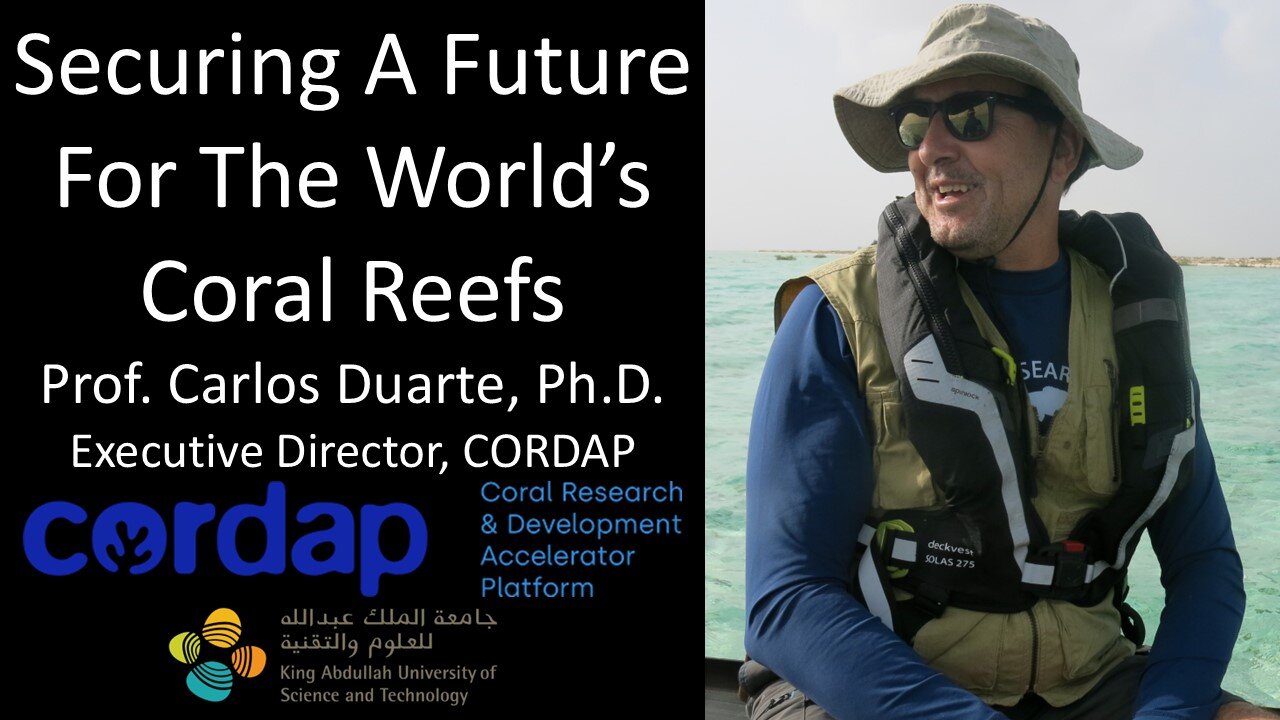Premium Only Content

Prof. Carlos Duarte, Ph.D. - Executive Director, Coral Research & Development Accelerator Platform
Professor Carlos Duarte, Ph.D. is Distinguished Professor, Marine Science, and Executive Director, Coral Research & Development Accelerator Platform ( CORDAP - https://cordap.org/ ), Biological and Environmental Science and Engineering Division, King Abdullah University of Science and Technology ( KAUST - https://www.kaust.edu.sa/en/study/faculty/carlos-duarte ), in Saudi Arabia, as well as Chief Scientist of Oceans2050, OceanUS, and E1Series.
Prior to these roles Professor Duarte was Research Professor with the Spanish National Research Council (CSIC) and Director of the Oceans Institute at The University of Western Australia. He also holds honorary positions at the Arctic Research Center in Aarhus University, Denmark and the Oceans Institute at The University of Western Australia.
Professor Duarte’s research focuses on understanding the effects of global change in marine ecosystems and developing nature-based solutions to global challenges, including climate change, and developing evidence-based strategies to rebuild the abundance of marine life by 2050.
Building on his research showing mangroves, seagrasses and salt-marshes to be globally-relevant carbon sinks, Professor Duarte developed, working with different UN agencies, the concept of Blue Carbon, as a nature-based solution to climate change, which has catalyzed their global conservation and restoration.
For the past years, Professor Duarte has also lead efforts to quantify the global role and importance of algal forests. He has conducted research across all continents and oceans, spanning most of the marine ecosystem types, from inland to near-shore and the deep sea and from microbes to whales, and has a particular focus on the role of seaweed aquaculture as a sustainable solution for multiple challenges.
Professor Duarte led the Malaspina 2010 Expedition, including over 700 scientists from 38 institutions from across 18 nations, that sailed the world’s oceans to examine the impacts of global change on ocean ecosystems and explore deep-sea biodiversity.
Professor Duarte served as President of the American Society of Limnology and Oceanography between 2007 and 2010. He has published more than 950 scientific papers a and has been ranked within the top 1% Highly-Cited Scientist by Thompson Reuters in all assessments of this rank, as was ranked as the top marine biologist in the world, and recently, the 12th most influential climate scientist in the world (Reuters). He has received many honors, including the G. Evelyn Hutchinson Award from the American Society of Limnology and Oceanography in 2001, the National Science Award of Spain (2007), and the I. Vernadsky Medal of the European Geophysical Union. the Prix d’Excellence by the International Council for the Exploration of the Seas (ICES, 2011), the Carlo Heip award for excellent in Marine Biodiversity (2018), and the Ramon Margalef Ecology Award (2019), and the BBVA Foundation Frontiers of Knowledge Award in Ecology and Conservation Biology (2020). Duarte received honorary doctorates from the Université de Québec a Montrèal (Canada) in 2010 and Utrecht University (The Netherlands) in 2012, as was appointed, in 2021, to the Spanish Academy of Sciences. He serves in the Expert Group supporting the High-Level Group, including 12 heads of states, proposing a pathway towards a Sustainable Ocean Economy.
Professor Duarte earned a bachelor's degree in environmental biology from Autonomous University of Madrid, Spain and obtained a Ph.D. in limnology from McGill University
#Corals #Oceans #Seagrass #BlueCarbon #BlueEconomy #Mangroves #Reefs #KAUST #ClimateChange #CarbonCapture #CarlosDuarte #Aquaculture #SaltwaterAgriculture #KingAbdullahUniversityOfScienceAndTechnology #KSA #SaudiArabia #RedSea #Bioprospecting #Genomics #CraigVenter #CarbonSink #Environment #Biodiversity #COP16 #Limnology #ProgressPotentialAndPossibilities #IraPastor #Podcast #Podcaster #ViralPodcast #STEM #Innovation #Technology #Science #Research
-
 LIVE
LIVE
Grant Stinchfield
19 hours agoDr. Drew Reveals The Video YouTube Refuses to Let You See! We Un-Censor it!
447 watching -
 LIVE
LIVE
The Dana Show with Dana Loesch
20 minutes agoTRUMP BEGINS SECOND TERM | The Dana Show LIVE On Rumble!
656 watching -
 50:06
50:06
The Rubin Report
1 hour agoThese Unexpected Executive Orders Signed by Trump Are Game-Changers with Co-Host Russell Brand
20.3K35 -
 1:59:33
1:59:33
Steven Crowder
4 hours ago🔴 EXPLAINED: Donald Trump’s Day One Orders & Elon’s Fake Nazi Hand Gesture
289K175 -
 LIVE
LIVE
Right Side Broadcasting Network
13 hours agoLIVE: President Trump Attends National Prayer Service in Washington, D.C. - 1/21/25
12,104 watching -
 1:47:32
1:47:32
Graham Allen
4 hours agoBack From The BRINK! Trump Erases The Biden Disaster On Day ONE!!
78.3K70 -
 LIVE
LIVE
Bare Knuckle Fighting Championship
1 day agoThe Bare Knuckle Show with Brian Soscia
139 watching -
 LIVE
LIVE
The Shannon Joy Show
1 hour ago🔥🔥Reality DC: Trump On Day ONE - An Avalanche Of Executive Orders While COVID Gaslighting Persists🔥🔥
363 watching -
 LIVE
LIVE
LFA TV
17 hours agoTRUMP'S 1ST DAY! HE'S BACK!| LIVE FROM AMERICA 1.21.25 11am
7,090 watching -
 2:31:20
2:31:20
Matt Kohrs
15 hours agoTrump Pumps Stocks, Pelosi's Trades & Breaking News || The MK Show
58.8K2